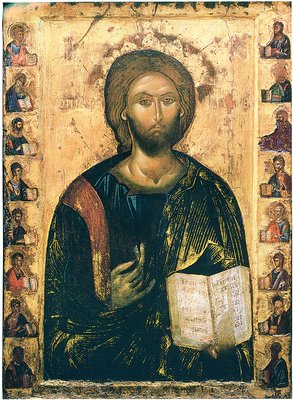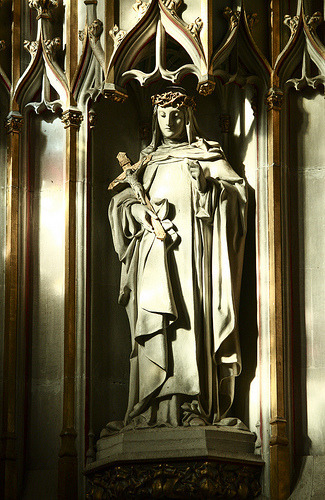Monday of week 6 in Ordinary Time  Basilica of Santi Vincenzo e Caterina de' Ricci, Prato, Italy Readings at MassLiturgical Colour: Green. Year: A(I).
The mark of CainThe man had intercourse with his wife Eve, and she conceived and gave birth to Cain. ‘I have acquired a man with the help of the Lord’ she said. She gave birth to a second child, Abel, the brother of Cain. Now Abel became a shepherd and kept flocks, while Cain tilled the soil. Time passed and Cain brought some of the produce of the soil as an offering for the Lord, while Abel for his part brought the first-born of his flock and some of their fat as well. The Lord looked with favour on Abel and his offering. But he did not look with favour on Cain and his offering, and Cain was very angry and downcast. The Lord asked Cain, ‘Why are you angry and downcast? If you are well disposed, ought you not to lift up your head? But if you are ill disposed, is not sin at the door like a crouching beast hungering for you, which you must master?’ Cain said to his brother Abel, ‘Let us go out’; and while they were in the open country, Cain set on his brother Abel and killed him. The Lord asked Cain, ‘Where is your brother Abel?’ ‘I do not know’ he replied. ‘Am I my brother’s guardian?’ ‘What have you done?’ the Lord asked. ‘Listen to the sound of your brother’s blood, crying out to me from the ground. Now be accursed and driven from the ground that has opened its mouth to receive your brother’s blood at your hands. When you till the ground it shall no longer yield you any of its produce. You shall be a fugitive and a wanderer over the earth.’ Then Cain said to the Lord, ‘My punishment is greater than I can bear. See! Today you drive me from this ground. I must hide from you, and be a fugitive and a wanderer over the earth. Why, whoever comes across me will kill me!’ ‘Very well, then,’ the Lord replied ‘if anyone kills Cain, sevenfold vengeance shall be taken for him.’ So the Lord put a mark on Cain, to prevent whoever might come across him from striking him down. Adam had intercourse with his wife, and she gave birth to a son whom she named Seth, ‘because God has granted me other offspring’ she said ‘in place of Abel, since Cain has killed him.’
Pay your sacrifice of thanksgiving to God. The God of gods, the Lord, has spoken and summoned the earth, from the rising of the sun to its setting. ‘I find no fault with your sacrifices, your offerings are always before me.’ Pay your sacrifice of thanksgiving to God. ‘But how can you recite my commandments and take my covenant on your lips, you who despise my law and throw my words to the winds? Pay your sacrifice of thanksgiving to God. ‘You who sit and malign your brother and slander your own mother’s son. You do this, and should I keep silence? Do you think that I am like you?’ Pay your sacrifice of thanksgiving to God.
Alleluia, alleluia! Harden not your hearts today, but listen to the voice of the Lord. Alleluia!
Alleluia, alleluia! I am the Way, the Truth and the Life, says the Lord; No one can come to the Father except through me. Alleluia!
No sign shall be given to this generationThe Pharisees came up and started a discussion with Jesus; they demanded of him a sign from heaven, to test him. And with a sigh that came straight from the heart he said, ‘Why does this generation demand a sign? I tell you solemnly, no sign shall be given to this generation.’ And leaving them again and re-embarking, he went away to the opposite shore. Christian Art Each day, The Christian Art website gives a picture and reflection on the Gospel of the day. The readings on this page are from the Jerusalem Bible, which is used at Mass in most of the English-speaking world. The New American Bible readings, which are used at Mass in the United States, are available in the Universalis apps, programs and downloads. |



